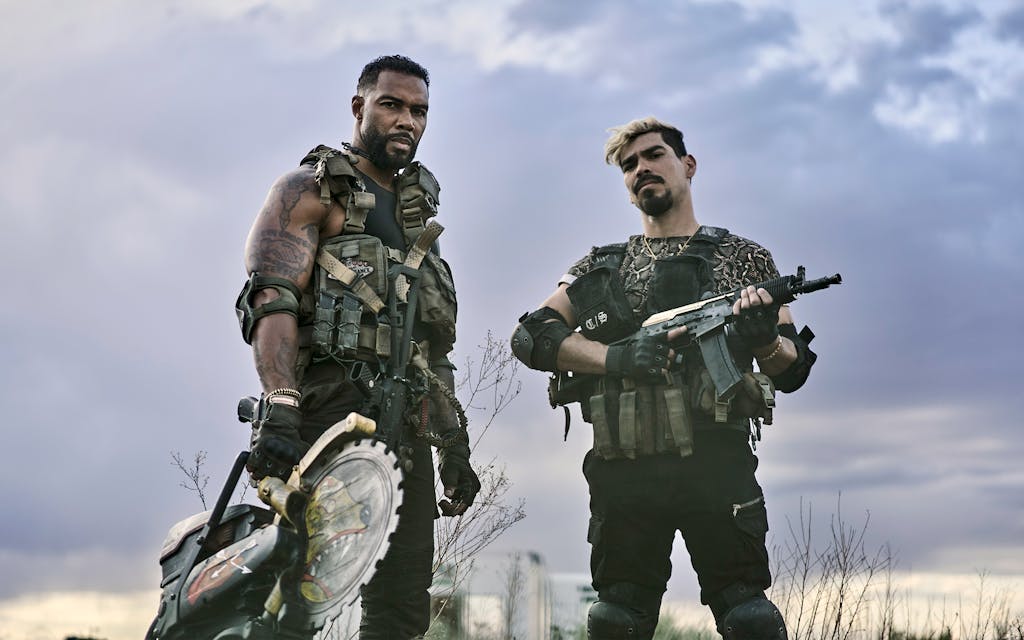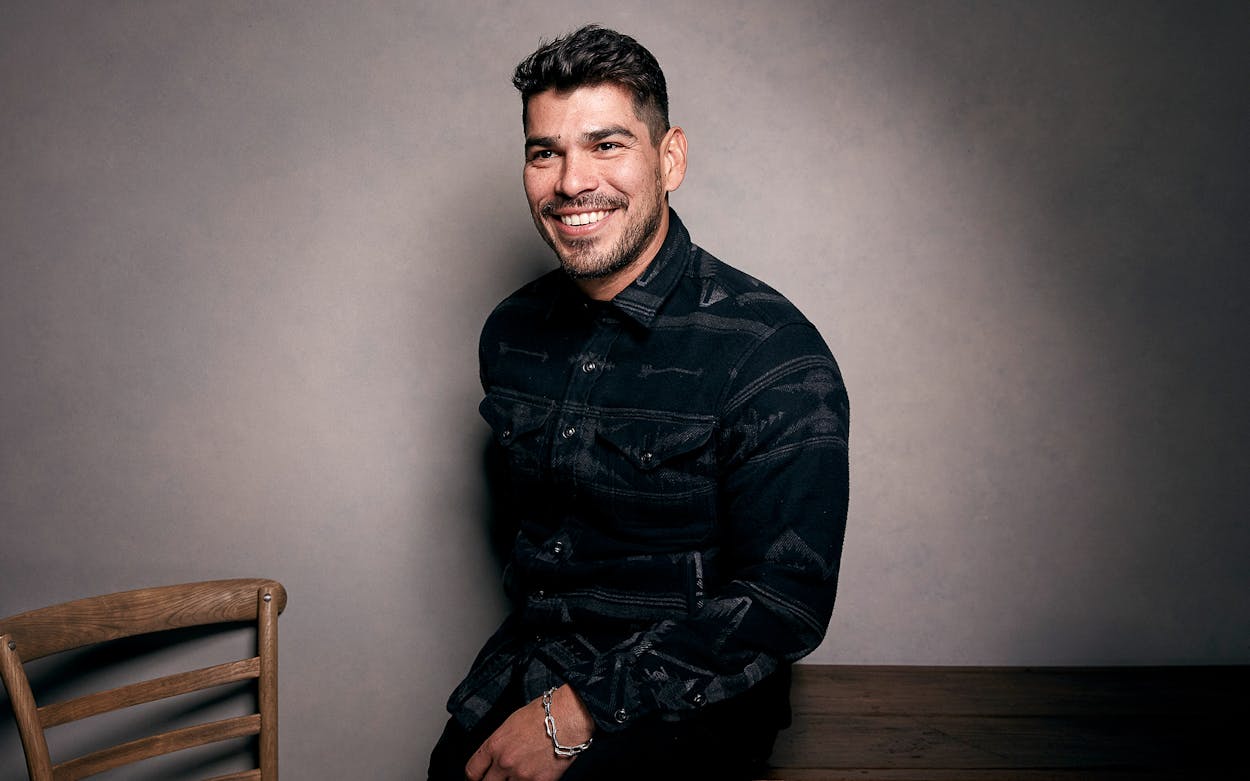Raúl Castillo never set out to be an actor.
First it was the bass guitar, then his punk-rock band, then writing, then directing, before, little by little, acting took over his life. He never studied it, at least not formally. He just watched, observing and cherry-picking techniques that he could incorporate into his own performances. There were struggles and triumphs, of course, but more recently, it feels almost as if he’d blinked and fifteen years had come and gone, leaving an impressive list of projects under his belt.
Castillo, 43, has been hustling—from a guest role on the HBO series Looking in 2014 that spiraled into his breakout role as a series regular, to back-to-back supporting roles in Guy Ritchie’s Wrath of Man and Zack Snyder’s Army of the Dead this year. With three more films slated for release later in 2021, this year is set to be his busiest yet.
Raised in McAllen, the son of first-generation immigrants, Castillo was a toddler when his family moved to Texas from Reynosa. As the middle child of three, he was a natural attention-seeker. “I think I was always acting, even when I didn’t know I was doing it,” he says. He put on elaborate performances for his little sister and cousins, and at eleven years old, he picked up the bass guitar—it was a way to get closer to his older brother (a guitar player), but also to forge his own path.
He formed a punk-rock band with friends in high school. Memorably named IPM (Influential Phecal Material), they played small gigs around town wherever they could get them. A few years later, they were renting time in studios around the Rio Grande Valley to record their songs, even as the Tejano engineers behind the glass didn’t quite understand their sound. “I don’t really think they knew what to do with these long-haired kids with their loud music,” laughs Castillo.
During his sophomore year at McAllen High School, a weathered collection of poems from the Nuyorican Poets Café put him on to the work of New York City playwright Miguel Piñero. Castillo’s drama teacher, John Farr, helped him comb through the anthology, encouraging him to act out part of Piñero’s play Short Eyes in class. But despite Farr’s mentorship, Castillo didn’t see a viable path from working-class McAllen teenager to successful playwright. So he adopted the punk-rock attitude that aided his music career, and decided he would just create opportunities for himself. “I didn’t know you could do what Piñero and these other poets were doing,” he says. “They were writing in English and Spanish; they were writing about their communities. I wanted to do that.”
He took off for the East Coast after high school, studying playwriting at Boston University, but eventually made his way back to Texas after graduation: “I needed to go back and find my roots.” Castillo moved to Austin and started a short-lived theater company, Nushank Theater Collective, which in 2000 mounted a production of Santos & Santos from El Paso playwright Octavio Solis. Castillo was dying to direct it, but his friends encouraged him to play the lead role of Tomás, the youngest of three brothers who’s struggling to navigate his identity as a Mexican American. Tómas’s role is the moral center of the show, as he’s forced into making impossible decisions in a world that’s stacked against him.
The shows, put on at the tiny black box theater at the Santa Cruz Center for Culture in East Austin, were packed. For Castillo, it changed everything. “It was instrumental for me to be at the heart of a story,” he says. “It made me change the way I saw myself.”
Castillo understands that all acting requires a certain level of improvisation, but he’s not an improviser. He’s still, at his core, a writer—he often ponders how each exchange of dialogue might set up the main conflict, or how the way his character is standing or sitting might read on screen. Even so, he’s prone to certain whims.
Stuck in a traffic jam in Houston one day in 2002, he decided he’d try out New York next. For years, he sustained himself with short films, small parts on TV, and regular stage gigs as a member of the off-Broadway troupe LAByrinth Theater Company, at that time led by John Ortiz and Philip Seymour Hoffman. Finally, in 2013, he got a call for Looking.
The comedy drama from HBO follows a group of three gay friends living in San Francisco. The role of Richie Ventura, a barber from the Mission District, was meant to be a brief love interest for Jonathan Groff’s character, Patrick. Castillo’s childhood friend and former girlfriend Tanya Saracho was writing for the show and thought he’d be a perfect fit. Throughout their careers, Saracho and Castillo have remained close, celebrating each other’s achievements and often reflecting on the years they spent dreaming up their careers. As kids, they hung out at one another’s houses, reading plays. “We’ve always been there for each other’s big life moments,” Saracho says. “My whole life, I’ve been his witness and he’s been mine.”
The Looking role became a fan favorite, prompting Buzzfeed quizzes and Facebook fan pages. His effortless chemistry with Groff earned him a promotion to a series regular for the show’s second and final season. Castillo’s performance was solid, sure of himself, and openhearted in comparison with those of the leads. He was also, at the time, a groundbreaking character. “How many times have we seen a brown queer man on TV with a fully fleshed out backstory? Someone who wasn’t othered or exoticized, but was a real romantic love interest?” Saracho asks. With Richie, there’s no over-the-top Chicano accent. He’s a barber who’s grounded and self-assured with what he wants in life, and while he’s estranged from his father because of his sexuality, his narrative arc doesn’t revolve around that trauma. “Richie was a fully fledged person. It’s crazy that that was so radical,” Saracho says.
After Looking came a recurring part in the Netflix series Atypical, and then a critically acclaimed role in the coming-of-age indie film We the Animals, in which Castillo played a tortured, volatile father of three. He’s worked with an enviable list of writers and directors, but he has yet to land a role that would truly launch him to a new level of fame. “It’s about that first opportunity,” he says. “People of color don’t get it often. This industry won’t take that gamble on us. They make stars out of random white folks all the time, but they won’t take a risk on us.”

Last year, as the world began to shut down during the pandemic, Castillo snagged his first big-budget action role. He landed a part in Zack Snyder’s over-the-top zombie heist film, Army of the Dead, as Mikey Guzman—a sharpshooter and vlogging star who’s been recruited as part of a team to retrieve $200 million from a zombie-ridden casino in Las Vegas. “The ten-year-old in me was giddy,” he laughs. “I loved zombie everything growing up. I was a huge fan of George Romero and Night of the Living Dead.” Two weeks after running around wielding weapons in the desert, he packed his bags for London, where he donned tactical gear as former military man Sam in Guy Ritchie’s heist thriller, Wrath of Man. “It was kind of a déjà vu moment because it was a lot of the same physicality from Army of the Dead, but I got to put that to good use.”
It’s fun to watch Castillo stretch and transform into an action star, but it’s his smaller, stranger roles that really show off his strengths. He acknowledges, though, that these latest gigs have given him the push he’s needed to get back to his roots and begin writing and producing projects he’s been sitting on for years: “I’m excited for new people to start discovering my work and for people who are already familiar with me to come along for the ride.”








